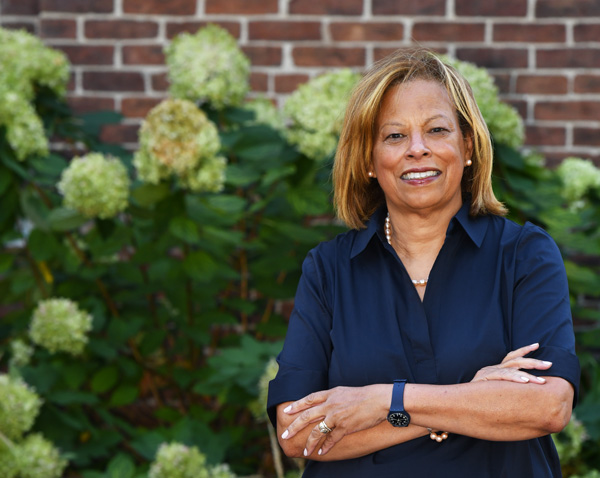‘I'm living into the call’
To an observer, Westina Matthews Shatteen ’70 has mastered the art of reinvention, but she begs to differ.“
I wouldn’t call it reinvention,” says Matthews, who traded a fast-paced corporate executive life in Manhattan for a quieter one of reflection, prayer and writing along the Wilmington River in Savannah where she lives with her husband, Alan Shatteen ’69.
 “I’m living into the call.”
“I’m living into the call.”
Her life’s journey has wound through an elementary school classroom in Yellow Springs, Ohio, where she counts comedian Dave Chappelle among her former students, to the Wall Street boardroom of Merrill Lynch, where she holds the distinction of being the first woman and person of color to be elected as a trustee of the foundation.
Upon “retirement,” she came back for a curtain call — researching women and girls of faith in Burundi as part of a Harvard University fellowship, awarding scholarships to minority youth as the chief program officer at the Jackie Robinson Foundation and hopscotching the country offering inspirational talks and spiritual retreats for the Episcopal Church. For nine years, she served on UD’s board of trustees and is featured in an exhibit of trailblazing women in UD’s Women’s Center.
Through it all, she’s kept a journal — often tapping out her thoughts on her iPhone on a plane — for weekly email reflections she shares like clockwork with friends on Tuesday mornings. Today, her poignant essays have turned into a new book, Dancing from the Inside Out: Grace-Filled Reflections on Growing Older, published by Church Publishing Inc. under her professional name of Westina Matthews. She returned home this fall to share a sneak preview with family, friends, students, faculty and administrators at her alma mater a week before the launch.
The book’s 80 short essays, told with wit and warmth, run the gamut from discovering God at a Starbucks to appreciating simple, everyday moments during the last days of her 99-year-old great aunt’s life. At a certain age, Matthews observes, some purposely choose to live joyfully in the moment, “dancing to the beat within.”
She urges all she meets to contemplate their lives, too, with an eye toward continually exploring the possibilities on the horizon. “I invite people to ponder questions about God’s call for their lives and learn to simply live into the questions and love them.”
A “preacher’s kid,” Matthews grew up in a deeply religious household. When she enrolled at UD during the tail end of the civil rights movement, she wore the uniform of the day — bell bottoms — while nuns who staffed the Marycrest Hall reception desk and lived among the women wore habits. Even though she wasn’t Catholic, she felt at home spiritually. And while she was one of just 19 black students on campus her first year, she forged her own path, drawing the attention of UD President Father Raymond Roesch, S.M., who relied on her to help build stronger communication between the administration and student body. Students elected her the first black homecoming queen, and Ellie Kurtz, director of Kennedy Union, quietly arranged to help pay her final semester’s tuition when her funds ran short.
“I felt loving support,” she recalls. “I felt a lot of people were praying for me to go out and do great things.”
After graduating from UD with a bachelor’s and then, in 1974, a master’s degree in education, she headed to Chicago to earn a doctorate from the University of Chicago. She left home with some trepidation and a treasured gift — a simple necklace with a mustard seed — from her mother, who quoted a Bible verse from Matthew: “Remember, so long as you have the faith of a single grain of mustard seed, all things are possible.”
That became her life’s mantra.
On 9/11, she clutched that necklace as she fled down 33 flights of stairs in the World Trade Center and over the Brooklyn Bridge “with the two towers billowing with fire and smoke behind me.” Later, when she saw the now-famous 20-foot cross made of two steel beams on the devastated site, she said she “knew deep within my soul that I needed to begin the process of forgiveness and reconciliation — and that I needed to spread a message of hope, love and faith.”
Her life, then, is not about reinvention. “It’s always been about service,” she says.